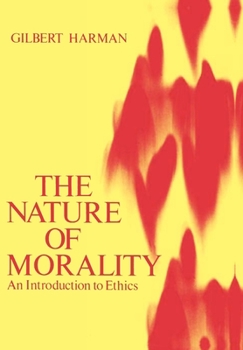The Nature of Morality: An Introduction to Ethics
Select Format
Select Condition 
Book Overview
Contains an overall account of morality in its philosophical format particularly with regard to problems of observation, evidence, and truth.
Format:Paperback
Language:English
ISBN:0195021436
ISBN13:9780195021431
Release Date:January 1977
Publisher:Oxford University Press
Length:192 Pages
Weight:0.65 lbs.
Dimensions:0.4" x 6.5" x 9.2"
Customer Reviews
2 ratings
Good Book on Moral Philosophy
Published by Thriftbooks.com User , 18 years ago
This is an introductory book on ethics which provides a marked advance of discussion of the nature of morality. The book is unique in its focus on the basic philosophical problem about morality and its apparent immunity from observational testing. The author considers a number of possible responses to the apparent fact that ethics is cut off from observational testing in a way that science is not. The author divides the book into five parts. Part I discusses the problem with ethics; Part II is on Emotivism; Part III is on Moral Law; Part IV on Reasons and Conventions whilst Part V is on Oneself and Others. This is recommended reading for those embarking on the study of moral philosophy.
Nice Introduction to Meta-Ethics, and to Harman's Relativism
Published by Thriftbooks.com User , 20 years ago
First, a point of clarification: this is basically a book about meta-ethics, not normative ethics. (Indeed, judging by his statements in the Preface, Harman thinks the properly philosophical part of thought about morality is exhausted by meta-ethics.) What is meta-ethics? The study of the metaphysics, semantics, epistemology, and psychology of morality. This isn't a textbook on ethics; it's an original work of philosophy written in such a way that it is accessible to those without a substantial philosophical background. Still, Harman does a pretty good job of introducing readers to many of the issues in meta-ethics while developing his own naturalistic account of morality, an account that ends up being a form of moral relativism. Harman does discuss positions other than those he favors, but they are discussed only insofar as they have some role to play in the progress in his own argument. And he does refer to historically important thinkers (e.g., Hume, Kant, Moore, and Hare), primarily using their work as a foil to his own or as a source of insights he can use in formulating his own theory. So this isn't a book for someone looking for comprehensive coverage of the positions in meta-ethics or an introduction to historical work on this subject. (If you're looking for a textbook on meta-ethics, you might try Stephen Darwall's Philosophical Ethics or Alexander Miller's recent An Introduction to Contemporary Meta-Ethics. Both of those works present and criticize most of the important positions in contemporary meta-ethics.)The book begins with a seminal, albeit frustrating, argument that Harman thinks poses a problem for the objectivity of ethics. Harman argues that a fundamental problem with putative moral facts, whose existence would be necessary for morality to be objective, is that it appears they cannot be tested against observation. He then presents an account of the nature of observation according to which this problem boils down to the fact that it appears moral facts cannot be fit into the explanatory framework provided by our scientific conception of the world. In particular, it seems we cannot understand how moral facts could causally interact with anything in the world in such a way that could ultimately cause our having experiences of them. Consequently, we cannot have observational evidence for or against claims about putative moral facts. The rest of the book can be understood as Harman's response to the worry presented in this chapter. First, Harman considers whether this argument ought to lead us directly to moral nihilism, the doctrine that there are no moral facts. He thinks not. In chapters 2-4 he scrutinizes some possible responses to this worry, including reductive naturalism, emotivism, and the ideal observer theory. This is followed by the long central section of the book in which he develops his own response to the worries about moral facts formulated in the first chapter. Harman ends up arguing that there






